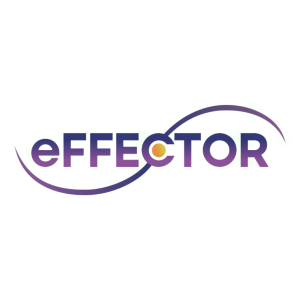eFFECTOR Therapeutics Announces Positive Top-Line Results from Phase 1b Clinical Trial of Zotatifin for the Treatment of COVID
Rhea-AI Summary
eFFECTOR Therapeutics announced positive top-line results from its Phase 1b clinical trial of zotatifin for treating COVID-19, presented at the 30th Conference on Retroviruses and Opportunistic Infections. The trial indicated favorable safety results, with zotatifin showing a quicker time to undetectable virus levels in saliva compared to placebo—3 days versus 7 days, respectively. Zotatifin was well tolerated and achieved target drug levels via a single subcutaneous injection. Preclinical data further demonstrated its effectiveness against various RNA viruses. The company believes these findings support continued development of zotatifin for COVID-19 and potential other RNA virus treatments.
Positive
- Zotatifin showed favorable safety results and was well tolerated across all doses.
- Achieved undetectable virus levels in saliva approximately twice as fast as placebo (median time: 3 days vs 7 days).
- Preclinical data demonstrated zotatifin's potency against multiple COVID variants and other RNA viruses.
Negative
- The trial was small, involving only 27 subjects treated with zotatifin.
- Secondary objectives showed only positive trends; statistical significance was not achieved (p=0.13).
News Market Reaction
On the day this news was published, EFTR declined 18.09%, reflecting a significant negative market reaction.
Data tracked by StockTitan Argus on the day of publication.
Results presented at 30th Conference on Retroviruses and Opportunistic Infections (CROI)
SOLANA BEACH, Calif. and REDWOOD CITY, Calif., Feb. 21, 2023 (GLOBE NEWSWIRE) -- eFFECTOR Therapeutics, Inc. (NASDAQ: EFTR), a leader in the development of selective translation regulator inhibitors (STRIs) for the treatment of cancer, today announced top-line results from its Phase 1b clinical trial of zotatifin for the treatment of COVID demonstrating favorable safety results as well as positive trends in several measures of antiviral activity. eFFECTOR also presented preclinical data that demonstrated the breadth of zotatifin’s activity against RNA viruses. These results were presented at the 30th Conference on Retroviruses and Opportunistic Infections on February 20, 2023.
“We’re pleased with the positive trends in antiviral activity seen in this small study, especially in the time to achieve undetectable virus levels in saliva”, said Steve Worland, president and CEO of eFFECTOR. “Coupled with the fact that zotatifin was generally well tolerated and achieved target drug levels via a single sub-cutaneous administration, we believe these results, as well as the potency and breadth of antiviral activity seen in preclinical studies, position zotatifin as an attractive option for further development to treat COVID, including disease due to evolving variants, and diseases that may emerge due to other RNA viruses.”
The primary objective of the trial was to evaluate safety of zotatifin in subjects with mild-to-moderate COVID. Zotatifin was generally well tolerated at all doses, with injection site reactions from the sub-cutaneous route (all Grade 1 or 2) being the only adverse event showing a potential relationship to zotatifin dose. Secondary and exploratory objectives included evaluation of antiviral activity in nasal and saliva samples and pharmacokinetics (PK). Trends in antiviral activity favoring zotatifin over placebo were seen by several assessments. In particular, in saliva, which was sampled more frequently than nasal cavity, virus level undetectability (VLU) was achieved approximately twice as fast in the zotatifin-treated subjects compared to placebo, with a median time to VLU of 3 days for zotatifin vs 7 days for placebo. The Hazard Ratio (HR) for achieving VLU in saliva was 2.83 (
In the randomized, double-blind, placebo-controlled dose escalation trial, 27 subjects received zotatifin at doses ranging from 0.01 to 0.035 mg/kg and 9 subjects received placebo. At the outset of the trial, one patient received zotatifin and one patient received placebo by intravenous administration. All other subjects (n=34) received study drug by sub-cutaneous injection. Enrolled subjects had mild or moderate COVID and were positive for SARS-CoV-2 RNA or antigen within 7 days of randomization. The trial was conducted in collaboration with the Quantitative Biosciences Institute (QBI) at the University of California, San Francisco (UCSF), which holds a
eFFECTOR also presented results from preclinical studies in which zotatifin was active against numerous COVID isolates and other coronaviruses and was 10-100 times more potent than several agents authorized by the FDA for treatment of COVID, based on concentrations required to achieve comparable reductions in virus yield and protection from virus-induced cytopathic effects in cell-based assays.
Zotatifin is a potent and sequence-selective small molecule inhibitor of eIF4A, a host protein required to unwind the complex secondary structures within the 5’- untranslated region of the genome of SARS-CoV-2 and other RNA viruses. As an investigational host-directed antiviral, zotatifin is intended to act on a human protein that the SARS-CoV-2 virus hijacks to synthesize new viruses. Inhibiting the activity of eIF4A prevents the translation of the viral polyprotein needed for replication of the virus. The Company believes zotatifin’s administration for COVID as a single sub-cutaneous injection fits well with the Test to Treat initiative and provides a convenient way to ensure compliance with a full course of therapy. Zotatifin reduced SARS-CoV-2 viral infectivity in a study conducted by the international research consortium QBI Coronavirus Research Group (QCRG), led by Nevan Krogan, and previously published in Nature.
About Zotatifin
Zotatifin is a potent and sequence-selective small molecule inhibitor of eIF4A that is designed to suppress expression of a network of cancer driving proteins, including Cyclins D and E, CDKs 2, 4 and 6 and select RTKs as well as KRAS. We are currently investigating zotatifin in ongoing clinical trials for solid tumors and as a potential host-directed antiviral therapy in patients with mild to moderate COVID-19 in collaboration with UCSF.
About the Quantitative Biosciences Institute (QBI)
The Quantitative Biosciences Institute (QBI) is a University of California organized research unit reporting through the UC San Francisco’s School of Pharmacy. QBI fosters collaborations across the biomedical and the physical sciences, seeking quantitative methods to address pressing problems in biology and biomedicine. Motivated by problems of human disease, QBI is committed to investigating fundamental biological mechanisms, because ultimately solutions to many diseases have been revealed by unexpected discoveries in the basic sciences. Learn more at qbi.ucsf.edu.
About eFFECTOR Therapeutics
eFFECTOR is a clinical-stage biopharmaceutical company pioneering the development of a new class of oncology drugs referred to as STRIs. eFFECTOR’s STRI product candidates target the eIF4F complex and its activating kinase, mitogen-activated protein kinase interacting kinase (MNK). The eIF4F complex is a central node where two of the most frequently mutated signaling pathways in cancer, the PI3K-AKT and RAS-MEK pathways, converge to activate the translation of select mRNA into proteins that are frequent culprits in key disease-driving processes. Each of eFFECTOR’s product candidates is designed to act on a single protein that drives the expression of a network of functionally related proteins, including oncoproteins and immunosuppressive proteins in T cells, that together control tumor growth, survival and immune evasion. eFFECTOR’s lead product candidate, tomivosertib, is a MNK inhibitor currently being evaluated in KICKSTART, a randomized, double-blind, placebo-controlled Phase 2b trial of tomivosertib in combination with pembrolizumab in patients with metastatic non-small cell lung cancer (NSCLC). Zotatifin, eFFECTOR’s inhibitor of eIF4A, is currently being evaluated in Phase 2a expansion cohorts in certain biomarker-positive solid tumors, including ER+ breast cancer and KRAS-mutant NSCLC. eFFECTOR has a global collaboration with Pfizer to develop inhibitors of a third target, eIF4E. In addition to the company’s oncology focus, zotatifin is being evaluated as a potential host-directed antiviral therapy in patients with mild to moderate COVID-19 in collaboration with UCSF, which holds a
Forward-Looking Statements
eFFECTOR cautions you that statements contained in this press release regarding matters that are not historical facts are forward-looking statements. The forward-looking statements are based on our current beliefs and expectations and include, but are not limited to, statements regarding: the future clinical development of zotatifin the potential of zotatifin as a treatment for COVID, diseases caused by other coronaviruses and in oncology; expectations of the COVID market opportunity; and the potential therapeutic benefits of our product candidates. Actual results may differ from those set forth in this press release due to the risks and uncertainties inherent in our business, including, without limitation: interim results of a clinical trial are not necessarily indicative of final results and one or more of the clinical outcomes may materially change as patient enrollment continues, following more comprehensive reviews of the data and as more patient data becomes available; potential delays in the commencement, enrollment and completion of clinical trials; additional disruptions to our operations from the COVID pandemic, including clinical trial and manufacturing delays; our dependence on third parties in connection with product manufacturing, research and preclinical and clinical testing; the results of preclinical studies and early clinical trials are not necessarily predictive of future results; the success of our clinical trials and preclinical studies for our product candidates is uncertain; we may use our capital resources sooner than expected and they may be insufficient to allow clinical trial readouts; regulatory developments in the United States and foreign countries; unexpected adverse side effects or inadequate efficacy of our product candidates that may limit their development, regulatory approval and/or commercialization, or may result in recalls or product liability claims; our ability to obtain and maintain intellectual property protection for our product candidates; and other risks described in our prior filings with the Securities and Exchange Commission. You are cautioned not to place undue reliance on these forward-looking statements, which speak only as of the date hereof, and we undertake no obligation to update such statements to reflect events that occur or circumstances that exist after the date hereof. All forward-looking statements are qualified in their entirety by this cautionary statement, which is made under the safe harbor provisions of the Private Securities Litigation Reform Act of 1995.
Contacts:
| Investors: | Media: | |
| Christopher M. Calabrese Managing Director LifeSci Advisors 917-680-5608 ccalabrese@lifesciadvisors.com | Kevin Gardner Managing Director LifeSci Advisors 617-283-2856 kgardner@lifesciadvisors.com | Mike Tattory Account Supervisor LifeSci Communications 609-802-6265 mtattory@lifescicomms.com |








